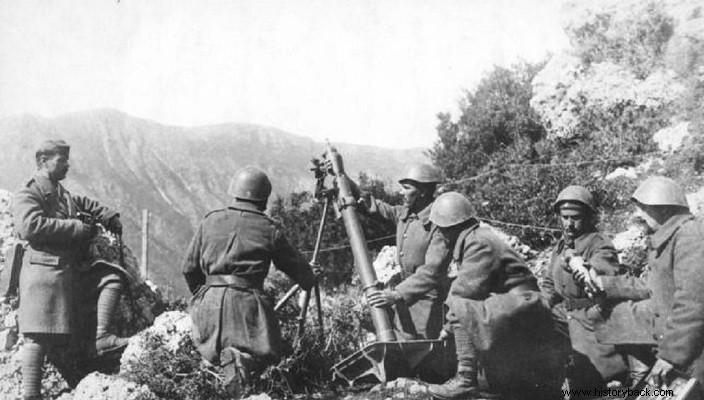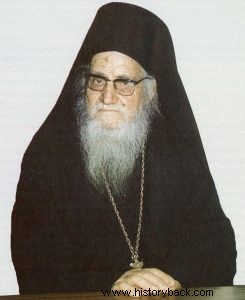
The archimandrite Theoktistos, born Vasilios Alexopoulos, was born in 1909 in the small village of Syrna in southeastern Gortynia. After graduating from Primary school he worked as a shoe shiner. He then learned the shoemaker's trade. However, his love for Christ led him to the decision to become a monk.
At the age of 17, he went to I.M. Zoodochos Pigi "Longovarda", Paros. He remained a probationary monk for two years, but in 1928 he presented himself normally to the army and served his military service, even being promoted to corporal. He was dismissed in 1930 and returned to the monastery where he became a monk, taking the name Theoktistos.
He was a patient with asthenia since he was a child, suffering for years from lung problems. Despite this, in 1940 he was again drafted into the army. Although sick, although a monk, Theoktistos presented himself normally, although he could avoid service and was even sent to the front, serving in the mortar company of the 68th Infantry Regiment of the X Infantry Division.
Theoktistus recorded his war experiences in a diary. Here are typical excerpts from what show the struggle of the Greek soldiers in the northern continental mountains, their hardships, but also their bravery, until the retreat:"In the morning the cannon began to beat and they fell back to us. Similarly, the machine gun was firing more intensively today. Airplanes were spoiling the world with the buzz. They passed many times. In the afternoon, some soldiers, dressed in Albanian, had come out and found Italian notices in the Greek language.
"They said:"Greek officers and soldiers. Bulgaria joined the Axis. Thirty German divisions are ready to invade Greece, so you will be destroyed. Your government, which invited the English, etc.' But all of us soldiers felt disgusted as soon as we read them. The Advocate says to me:"What do you take out and observe from the announcement?". I answered him:"Evilness and roughness".
"At the top, two homobrontes fell. But our mortar was hitting them. The mortars of the 3rd Battalion were also firing and the Italians turned there. The duel between mortars and Italian artillery would last for about a quarter of an hour, so that all the mortars were scared, and the machine gunners were walking around standing up.
"Why this?" Sergeant Fragos answered my question:The place where we are is unfired, that is, artillery shells cannot find us, or they will fall behind us or hit the top, as it happened. Therefore they were not afraid, because they knew it. But Olmos can find us, because it falls absolutely vertically.
"So we shouldn't be afraid of the artillery, because here, where we are, it won't find us. Our conclusion is that the Italians saw our forward soldiers and mortared them. As soon as we hit them and the mortar fell into the artillery, it killed them instantly and they disappeared"...
"At 9 a.m. The Italians started to attack us. They fired several shells, but they ordered us, and we also sent them a few shells. The machine guns roared all day. I wrote to Bilalis, Argyrakin and Mavris. In the evening I went to sleep early, but as soon as I woke up, the Major informs us that he has clear information that the Italians are ready to attack us tonight, as the weather was helping, the fog. .
"He gave us the information about the flares, with which our reinforcements would be requested, etc. We here always throw with the one mortar, "Victory" no. 255. We call the other one "Freedom", and it has no. 126. Tonight he told us that we should shoot in the direction that "Freedom" is facing (this was the humble mortar).
"Because we had no weight on its base and as soon as we dropped it, it would move, and with all the darkness it was, we managed with a soldier and tore a sack, filled it with earth and placed it on the base and we were no longer afraid to drop us forward. We appointed guards and patrols to look out, etc.
"The machine gunners had also prepared their machine guns. At midnight, first the machine guns and immediately the mortars and grenades began to fire. Artillery was not heard. We were ready and expected a flare, but the Major says to us:"Go ahead, what are you waiting for? Why don't you drop them?".
"However, he said and we fired again with "Niki" and not with "Eleftherian", because the Italians shoot from the place, which is placed by "Niki". For 5-7 minutes we fired about thirty projectiles at them with only one mortar. As soon as we stopped, nothing was heard from the Italians. The Major was overjoyed and congratulated us. We told him to give us information about the Macedonian Front, but he doesn't know anything. Bad omen”…
"A shell fell at a distance of ten meters and it didn't explode? We all made our cross and glorified God. A little further up, the animal had turned around, they had pushed it aside and the other world was passing by. I prayed and started to unload it. If someone is going to come, let them come"... "I mean, we were training continuously for almost 34 hours. Fortunately, however, Leontios had bread and we ate".
"In the morning, Efstration and I sang. A colleague from Chalkidos also came to the Liturgy. He had a very beautiful and powerful voice, but he was not a very good craftsman. The priest begged us and we chanted the "Katavasias" again. He had never heard so well before. But we sang together and it was nice. Leontius spoke. Before "Soikonikos" it was spread that the Germans are coming to arrest us. In 5 minutes you didn't see a soldier in the village, they got scared and left"...
However, the patient Theoktistos survived the war. He passed away at the age of 100, having served for many years as abbot of the Holy Forerunner of Gortynia.

